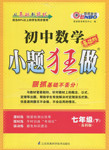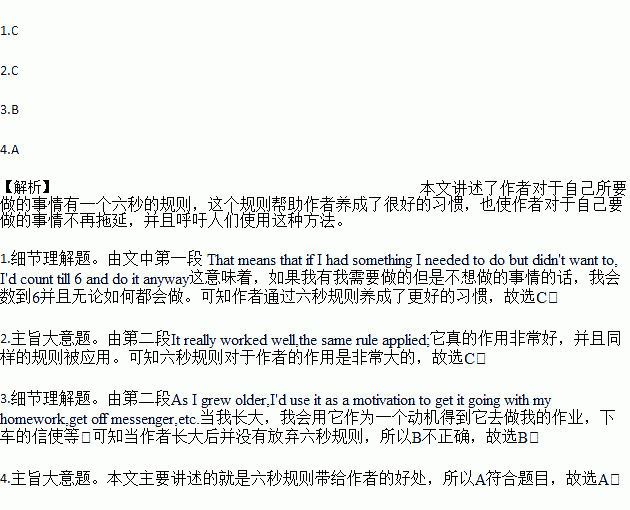题目内容
Ever since I was a kid I had a 6 second rule.That means that if I had something I needed to do but didn't want to, I'd count till 6 and do it anyway.My personal rule was to just never ever break that rule,that at 6,I HAD to get it going.Most of the time I'd use it to get out of bed or get out of the bath.Sometimes I'd also use it to restrict my time playing "ok in 6 seconds I'll stop playing with my dolls."
As I grew older,I'd use it as a motivation to get it going with my homework,get off messenger,etc.It really worked well,the same rule applied;whatever happens,don't cheat the "rule of 6." Most of the time,I wouldn't even have to count till 6 because I knew it would just mean I d have to do it,so I'd just do it anyway.As an adult,I've pretty much conditioned myself to do things by the rule of 6.I've pretty much mastered most usual things in my life but the rule of 6 never fails me when I start something new.Exercising,running,getting cooking,starting reading,it just works for me.
At the time,when I was 6,6 was my favorite number.So just go ahead and pick a number from 1-10 (although Id suggest 3-10) and try it.The important thing is not just to let yourself down.Like any other trick,it only works if you allow it to.
1.As a kid,the author, .
A. played with his dolls all the time
B. hated to get out of bed very early
C. formed a good habit by the rule of 6
D. always needed to do something unwillingly
2.The main idea of the second paragraph is .
A. The rule was not useful as he grew older
B. Cheating the rule means that he can't do anything well
C. The rule works well for him all the time
D. The rule never fails him when he starts something new
3.Which one in the following sentence is WRONG?
A. The author would use the rule to get out of bed.
B. As the author grew older,he gave up the rule.
C. 6 was the author's favourite number.
D. The 6 second rule is useful and helpful to the author.
4.What can be a suitable title for the text?
A. A 6 Second Rule
B. The Most Useful Habit
C. My Favorite Number
D. A Meaningful Story
 小题狂做系列答案
小题狂做系列答案
